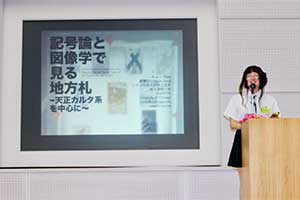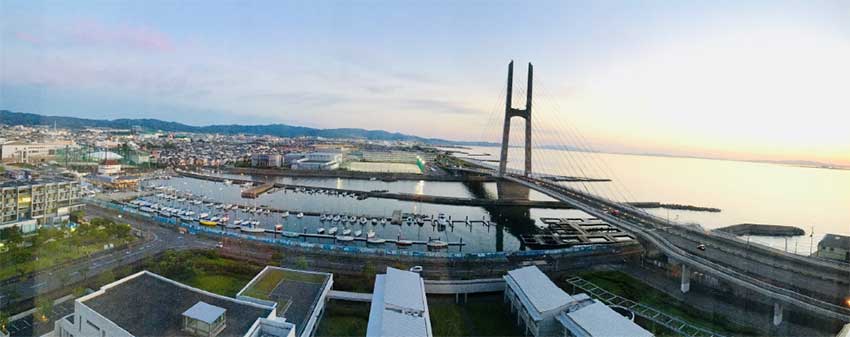

 2019 Japan Foundation Japanese-language Program for Specialists IN A Cultural FIELD
2019 Japan Foundation Japanese-language Program for Specialists IN A Cultural FIELDThe two-month language-training program provided by the Japan Foundation was a wonderful experience for my academic Japanese-language study and my current Kansai-region based research project on Chihōfuda regional karuta Japanese playing cards. Under kind guidance and support provided by the center staff, tutors, and instructors, I spent two productive months at the Japan Foundation Japan-Language Institute, Kansai (Kansai Center) with ten other graduate students and specialists in various fields from all over the world.
At the center, I mainly took academic-Japanese courses for writing papers and for communicating with researchers via phone and email. The center also provided workshops to walk us through the database system for gathering research materials like books and articles. Furthermore, the center library offered wonderful resources to help us navigate through Japanese academic databases and to assist us with our needs for research materials and documents that might be available only in Japan.
The location of the Kansai Center, which was near the Rinku Station (and was also right next to the Kansai International Airport), enabled me to travel conveniently to places in the Kansai region to conduct my research and interviews with collectors and scholars. Also, thanks to the research trip arranged by the Center, I made my very first trip to Tokyo and was able to meet with important scholars in the field of karuta Japanese playing cards. With all these fantastic opportunities, through my two-month stay in Japan, I spent meaningful time meeting and talking with collectors and scholars. Many of the playing-card collectors and scholars even shared their valuable documents and materials with me to help advance my research. I received their kind support, guidance, and advice, and I broadened my network with researchers in Japan.
By the end of the two-month program, all of us presented our research to show the productive outcome during our stay at the Kasai Center. The presentation was a great chance to showcase our research, and to challenge ourselves to work on Japanese presentation in front of a native Japanese audience. I received helpful advice and encouraging words from local Japanese listeners, our tutors, and our Japanese instructors. Moreover, as each of the eleven participants had unique research topics, the presentation was also an event to help us further understand each other’s study and progress.
The eleven participants included librarians, curators, teachers, and graduate students, from seven countries, including Australia, China, Chile, Indonesia, Kazakhstan, Russia, and Ukraine. In addition to working on my own research project, during my free time, I was able to meet and talk with the other participants from varied cultural backgrounds to learn about their fields and their research topics, while getting to know cultures and customs of different countries. We lived in the same dormitory and had meals at the same cafeteria, and we got to know each other better and better day by day. We participated in events arranged by the center such as “Osaka Orienting,” in which we traveled in groups to Osaka to learn about transportation and everyday life in Japan. We also made a visit to Kobe University, welcomed by graduate student representatives from the International Studies program.
Moreover, the center organized Japanese cultural experience activities to help us take a break from our busy studies and learn about Japanese language and culture through a lens which was different from the academic one. In calligraphy class, under guidance of a calligraphy instructor, we learned about the history of calligraphy, different ways of writing kanji Chinese characters, and the way to handle brush and ink to write kanji on our own. Then, in tea-ceremony class, we had the chance to visit the traditional Japanese tatami room to enjoy matcha Japanese green tea while learning manners in Japanese tea ceremony. Near the end of the program, we even made a trip to the National Bunraku Theatre in Osaka to see our very first Bunraku puppet play, after learning about the history of Bunraku and the story of the Bunraku play.
Additionally, to help us experience the everyday Japanese life, the center and the Tajiritown International Club planned events for us to befriend the local Japanese and learn more about the local customs and Japanese culture. The center arranged a home-visit program for us to meet with local families and sit together at the table to have dinner and chat. The host families presented us with great hospitality and took us to visit interesting local places. Meanwhile, the Tajiri-town International Club invited us to celebrate Marine Day in July by offering us a ride on yachts to enjoy the ocean breeze.
Overall, the two-month Japanese-training program provided by the Japan Foundation was not only an excellent opportunity for us to improve our skills in academic Japanese and research; the program was also a valuable experience to further understand Japanese culture and build friendships with international scholars and local Japanese. Thanks to the kind guidance and support from our tutor, Japanese instructors, and all the staff at the center, our stay was a fruitful and memorable one, further encouraging and inspiring us to pursue our research goals and careers in the field of Japanese and cultural studies.
